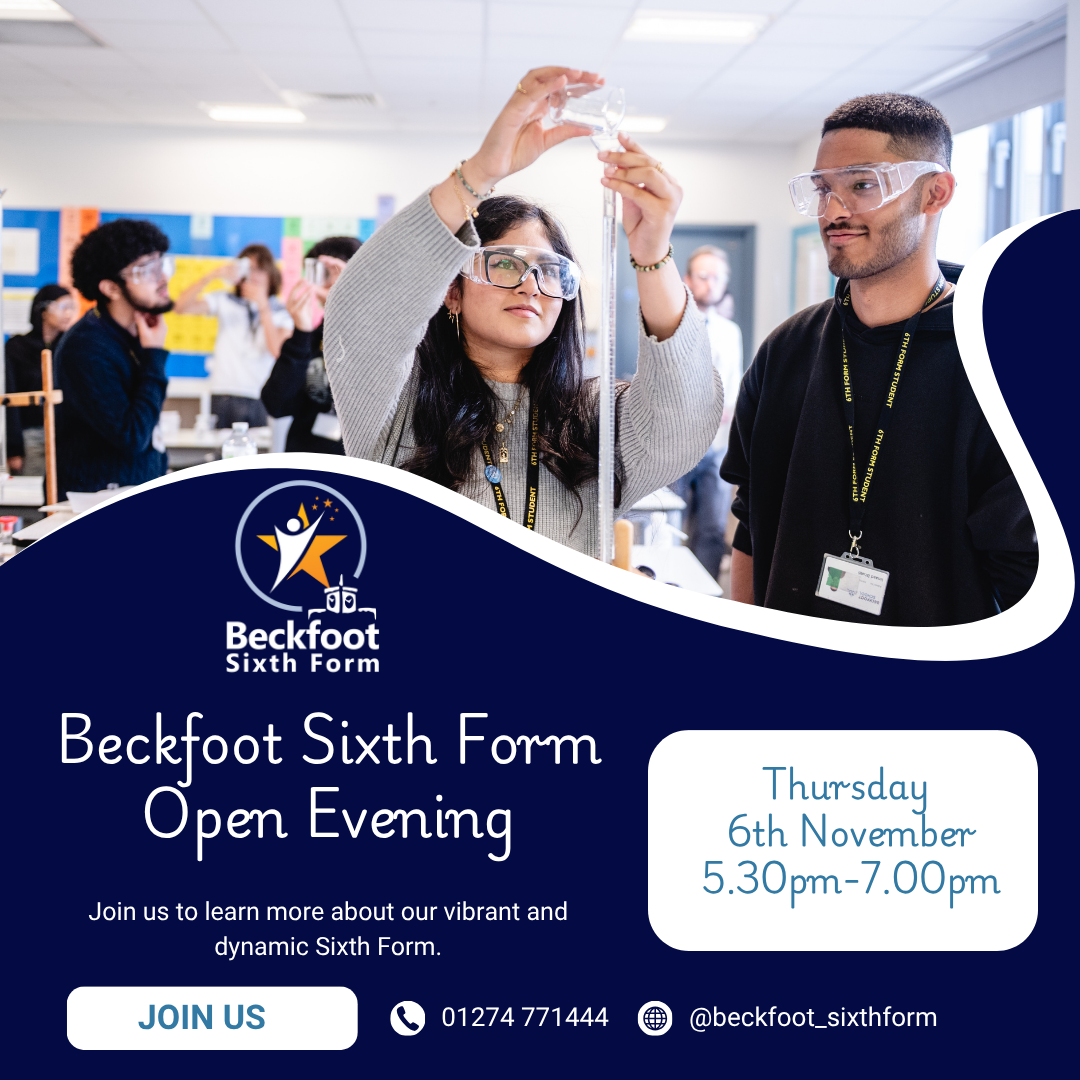Sixth Form Open Evening - Thursday 6 November 2025



Geography at Beckfoot will provide students with an understanding of the world and their place in it, with a firm grasp of both physical and human geography.
We instill an empathy in our students as a global citizen and an appreciation in developing a better world for the future. Students will be custodians of the environment. Beckfoot geographers will show a passion for learning through enquiry.
Our students are encouraged to develop a detailed knowledge of the real world and use all detailed knowledge to support their points and arguments.
Our Geography students enjoy hands on learning through local fieldwork trips to Hornsea, where students can examine coastal processes in action. Our Sixth Form students also enjoy a residential visit to the Lake District.
These experiences bring geography to life and deepen understanding beyond the classroom.
In years 7, 8 and 9, internal assessments will take place throughout each year to monitor student progress and further inform teaching and learning.
At GCSE, students will be assessed in three written exams at the end of Year 11, with mocks and internal assessments over two years to monitor progress.
Geography at Beckfoot will develop a range of employable skills: analysis and evaluation, researching and supporting arguments. Students will also have opportunities to present their ideas and argue their opinions.
| Year | Cycle 1 | Cycle 2 | Cycle 3 |
|---|---|---|---|
| Year 7 | Geographical skills: Students will learn basic map skills so they can confidently read an Atlas Map and describe locations. | Ice on the land: Students will learn about the changes in global ice coverage and the physical processes within a glacier that result in distinctive glacial landforms such as a corrie and glacial trough. | Life in a hot desert: Students will understand the climate in a hot desert and continue to learn about biodiversity and how humans threaten the environment. |
| Year 8 | Volcanoes: Students will gain an introduction to plate tectonics and natural hazards, as they focus on the cause and impacts of volcanic eruptions. They will be able to identify constructive and destructive plate boundaries and describe how movement can cause volcanic eruptions. | Urban geography: Students will understand the concepts of urbanisation and growth in UK cities and compare opportunities and challenges of urbanisation in HIC’s and LIC’s. Students will also look at sustainable urban living. | Development in the Horn of Africa: Introduction to the concept of development, development gaps and inequality, as students learn about concepts of poverty and the promotion of economic development. They will be able to explain the causes of inequality in development and suggest strategies to reduce inequalities. |
| Year 9 | Russia: This unit looks at the physical and human landscape of Russia and their interdependence. Students will be introduced to geopolitics and the concept of superpowers and Russia’s political status. | Middle East: The unit looks at the physical and human of the Middle East and their interdependence. Students will look at Dubai to study sustainability, Middle Eastern conflicts and their impacts. | South West China: This unit focuses on the physical and human landscape of South West China and their interdependence. The unit also encourages students to develop their World knowledge and make comparisons between places. The unit then focuses on the development of China, its population and its relationship to the wider the world. The unit recaps Geopolitics and the concept of superpowers. |
| Year 10 | Living world: Tropical Rainforests – Understanding the economic and environmental issues of deforestation and how to manage this. | The challenge of natural hazards: tectonic hazards – understanding the primary and secondary effects of a tectonic hazard, that effects and responses to them vary according to wealth, and that management can reduce the hazard. | Urban issues and challenges: Understanding that urban growth creates opportunities and challenges for cities in LICs and NEEs, how urban changes leads to social, economic and environmental challenges and how urban sustainability requires management of resources and transport. An overview of the UK population and the major UK cities. |
| Year 11 | Physical landscapes in the UK: river landscapes – distinctive fluvial landforms and management strategies for flooding. | Physical landscapes in the UK: Coastal landscapes – looking at distinctive coastal landforms and understanding that they are the result of rock type, structure and physical processes. Looking at strategies to protect coastlines. | Resource management: students will understand the changing demand and provision of resources in the UK, looking at ways to increase food supply, water supply and energy supply. |